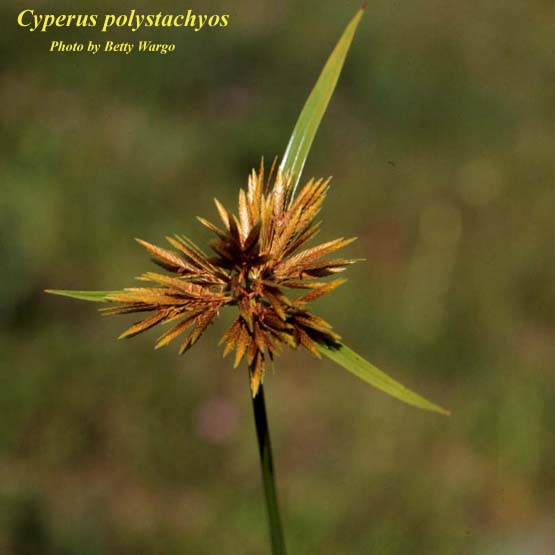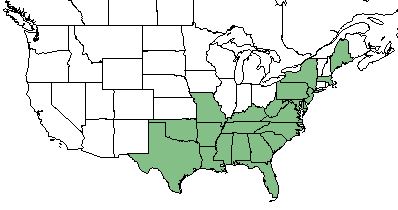Difference between revisions of "Cyperus polystachyos"
(→Conservation and Management) |
|||
| Line 41: | Line 41: | ||
==Conservation and Management== | ==Conservation and Management== | ||
| + | ''C. polystachyos'' is listed as endangered by the New Jersey Department of Environmental Protection and Energy Office of Natural Lands Management, and as extirpated by the Pennsylvania Department of Conservation and Natural Resources. <ref name= "USDA Plant Database"/> | ||
==Cultivation and restoration== | ==Cultivation and restoration== | ||
Revision as of 16:19, 18 May 2018
| Cyperus polystachyos | |
|---|---|

| |
| Photo by the Atlas of Florida Plants Database | |
| Scientific classification | |
| Kingdom: | Plantae |
| Division: | Magnoliophyta - Flowering plants |
| Class: | Liliopsida - Moncots |
| Order: | Cyperales |
| Family: | Cyperaceae |
| Genus: | Cyperus |
| Species: | C. polystachyos |
| Binomial name | |
| Cyperus polystachyos Rottb. | |

| |
| Natural range of Cyperus polystachyos from USDA NRCS Plants Database. | |
Contents
Taxonomic Notes
Synonyms: C. polystachyos Rottbøll var. texensis (Torrey) Fernald; C. polystachyos var. paniculatus (Rottbøll) C.B. Clarke; C. microdontus Torrey; C. paniculatus Rottbøll
Varieties: Cyperus prolifer Lamarck
Description
C. polystachyos is an annual/perennial graminoid of the Cyperaceae family native to North America, Hawaii, Puerto Rico, and the U.S. Virgin Islands, and both native and introduced to the Pacific Belt. [1]
Distribution
C. polystachyos can be found along the southeastern coast from Texas to Maine, Hawaii, the Pacific Belt, Puerto Rico, and the U.S. Virgin Islands. [1]
Ecology
Habitat
C. polystachyos proliferates in low fields, ditches and marshes, as well as pantropical and warm temperate environments. [2]
Conservation and Management
C. polystachyos is listed as endangered by the New Jersey Department of Environmental Protection and Energy Office of Natural Lands Management, and as extirpated by the Pennsylvania Department of Conservation and Natural Resources. [1]
Cultivation and restoration
Photo Gallery
References and notes
- ↑ 1.0 1.1 1.2 USDA Plant Database https://plants.usda.gov/core/profile?symbol=CYPO
- ↑ Weakley, A. S. (2015). Flora of the Southern and Mid-Atlantic States. Chapel Hill, NC, University of North Carolina Herbarium.